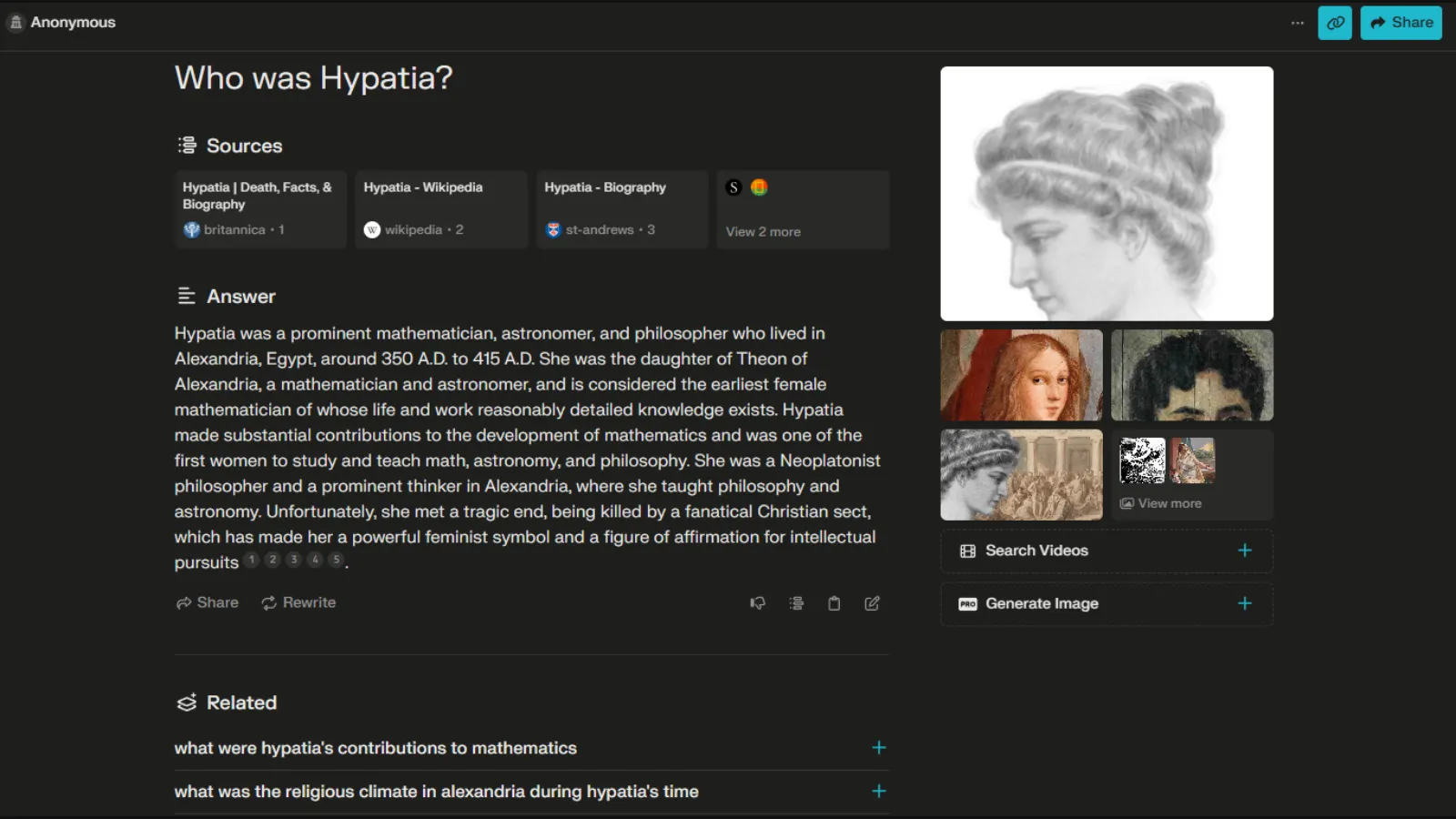Every day—and often several times a day—someone, somewhere is pitching a new AI chatbot, hoping to capitalize on the global tech sensation born of the launch of ChatGPT last year. But Perplexity AI CEO Aravind Srinivas will be the first to tell you that chatbots are passé, and that the world doesn’t need another clone of OpenAI’s flagship AI model.
“We want to communicate clearly to the end user that we're not here to sell you another chatbot and alternative to ChatGPT,” Srinivas told Decrypt. “We're here to help find answers to any question, and that's why we call [Perplexity] an answer engine.”
Srinivas said the answer engine label comes from the core differentiator of Perplexity AI, designed to provide comprehensive answers that include links to sourced information.

The founder's academic background, Srinivas said, shaped the design of Perplexity, noting that in academia, every statement in a paper requires a citation for credibility.
“We took that to heart and said, ‘What if a product is built in a way where it's always grounded in real facts, rather than making up things and saying whatever it wants?"
To aid in its goal to create a better AI-powered search experience, Perplexity announced the raise of $74 million in Series B funding led by venture capital firm IVP on Thursday. The money, Srinivas said, will go towards scaling Perplexity to deal with the steady increase in users the platform has seen since its launch two years ago.
“Obviously, the world was super excited about ChatGPT,” Srinivas said. “But it's not like we have to make everything a chatbot—that may not even be the best user interface for search.”
While Perplexity is designed to offer follow-up answers to a question, Srinivas said the company aims to improve the AI to the point where follow-up questions become less necessary, indicating a deep understanding of the user's intent right from the initial response.
Perplexity AI was launched in August 2022 by a team of developers and engineers from OpenAI, Meta, Quora, and Databrick, all led by Srinivas, Denis Yarats, Johnny Ho, and Andy Konwinski.
Others joining the funding round include NEA, Elad Gil, Nat Friedman, Databricks, NVIDIA, the Bezos Expeditions Fund, Tobi Lutke, Bessemer Venture Partners, Naval Ravikant, Balaji Srinivasan, Guillermo Rauch, Austen Allred, Factorial Funds, and Kindred Ventures.
As companies race to develop AI models that can be all things to all people, Srinivas says Perplexity is model agnostic and uses whichever model works best for them and their users.
“We don’t have a model ownership mentality; we choose the best fit for each task. Our goal is to develop our model to be optimal for our specific product, which may not be the best for every scenario,” Srinivas said.
Srinivas said this model-agnostic approach lets Perplexity adapt and use the most effective model for each use case, ensuring the best results.
“That's actually a good position to be in where you're not actually tied to any model provider,” he said.
The proliferation of generative AI tools in the wake of the launch of ChatGPT has led many to liken the development of the emerging technology to a nuclear arms race—and fears of AI disruption range from losing a livelihood to total annihilation.
In November, xAI CEO Elon Musk predicted the end of the modern workforce thanks to artificial intelligence.
“For the first time, we will have something that is smarter than the smartest human,” Musk said. “It's hard to say exactly what that moment is, but there will come a point where no job is needed—you can have a job if you want to have a job for sort of personal satisfaction, but the AI will be able to do everything.”
Srinivas said that despite the doomsaying around generative AI, he is optimistic about the future of the technology.
“I feel optimistic. However, I have a very different perspective on generative AI compared to most people,” he said. “My perspective of generative AI is that we need to view it as more like a utility tool rather than an agent that replaces a human. Perplexity is meant to be that.
“I want Perplexity to be like a toaster in your house that you just use, and you don't even care why it exists, but you just use it,” he added, noting that AI should not be like the AI Samantha from the 2013 movie “Her.”
Instead, Srinivas said, AI should be non-judgmental and always ready to respond and help lower the barrier to learning new subjects—and not be an AI girlfriend or companion.
Srinivas said he is happy to have Perplexity sticking to the basics.
“That’s not the vision we have here,” he said. “I'm happy with just executing on the boring task of being the most accurate answer engine in the world, and that can just be factually right all the time.”
Edited by Ryan Ozawa.

